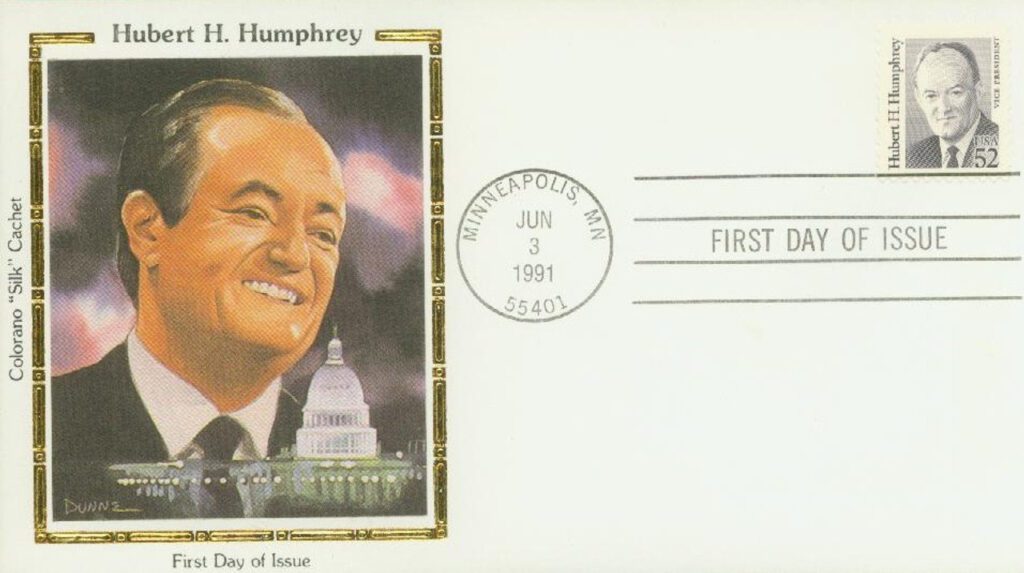
Hubert Horatio Humphrey Jr. was born on May 27, 1911, in Wallace, South Dakota. He was a leading political figure in the mid-1900s, promoting the Civil Rights Act, Voting Rights Act, and more.
Humphrey’s father was a pharmacist who at times was also mayor and member of the town council and state legislature. Humphrey attended the University of Minnesota for one year, but had to leave because of the family’s financial struggles. He earned his pharmacist’s license and helped his father run his drugstore from 1931 to 1937. He and his father also developed a wide range of products for humans and hogs, which made them the go-to pharmacy for many farmers.
Humphrey longed to return to school to study political science and become a college professor. When the family store was once again successful, he left to resume his studies at the University of Minnesota. Humphrey then earned his master’s degree at Louisiana State University. He worked for the Work Projects Administration, established as part of President Franklin D. Roosevelt’s “New Deal,” and for the War Manpower Commission in Minneapolis, Minnesota. Humphrey also taught political science at Macalester College in St. Paul, Minnesota. He tried to enlist three times during World War II, but was repeatedly rejected for colorblindness and other health issues.
Humphrey’s political career began on an unsuccessful note when he failed to win election as the mayor of Minneapolis, Minnesota, in 1943. Humphrey continued to work in politics, and in 1945, he reached that office. He was re-elected in 1947. His prominence in national politics began at the 1948 Democratic Convention, when he led the party to take a strong stand on civil rights, urging the party “to get out of the shadow of states’ rights and walk forthrightly into the bright sunshine of human rights.”

In 1948, the people of Minnesota elected Humphrey to his first term in the US Senate. He was young, eager, outspoken, and calling for reform, which earned him few friends early on. But Humphrey was dedicated to issues such as civil rights, labor, and education, and sponsored over 1,000 bills and joint resolutions during his first two terms in the Senate alone.
Humphrey became the Senate Democratic whip (assistant leader) in 1961. He fought for arms control, civil rights, medical benefits for the poor, and support of education. He was instrumental in the passage of the 1963 Limited Nuclear Test Ban Treaty and the 1964 Civil Rights Act.
In 1964, President Lyndon Johnson selected Humphrey as his running mate in the presidential election. Johnson’s bid was successful, and Humphrey resigned from the Senate to begin his term as vice president in 1965. Initially, he actively promoted the administration’s agenda and helped secure the passage of important legislation, including the Voting Rights Act of 1965. However, Johnson’s Great Society program began to lose support and Humphrey questioned some of Johnson’s policies in Vietnam, leading the vice president to be shut out of many high-level meetings. But Humphrey remained busy, promoting the administration’s Vietnam policies, which disappointed many of his own supporters. He also traveled more than any vice president before him – 12 trips outside the US to 31 countries.
When Johnson decided not to run for another term in 1968, Humphrey received the Democratic party’s nomination for president. However, he was defeated by former Vice President Richard Nixon by less than 1% of the popular vote. Although he campaigned for the nomination, Humphrey was not selected as a Democratic candidate for the 1972 election.
Humphrey was again elected to the Senate in 1970 and 1976. In 1977, the Senate appointed him deputy president pro tempore of the Senate. The position was newly created, with the resolution stating that and former president or vice president serving in the Senate would be entitled to the position. The role was largely ceremonial, but did come with a salary increase equal to that of the president pro tempore and the majority and minority leaders. Known as the “Happy Warrior,” Humphrey continued his loyal public service as a leading senator even after he was diagnosed as terminally ill and in great physical pain. He died while still in office on January 13, 1978. Humphrey was posthumously awarded the Congressional Gold Medal and the Presidential Medal of Freedom. Today there are several schools, buildings, and other places named in his honor.
| FREE printable This Day in History album pages Download a PDF of today’s article. Get a binder or other supplies to create your This Day in History album. |
Discover what else happened on This Day in History.
Do you know what author and lexicographer helped to standardize the American spelling of many of words? Check back tomorrow for the full story!





Being the age I am, I do remember him. I remember Mr Humphrey as being one of the few democrats that I actually liked. If he had become president, I think he would have been a good one.
Humphrey’s dad moved his drugstore to Huron, SD where my family was from and my Grandmother was very good friends. My grandmother was a rabid Republican and therefore disliked the Humphreys intensly, even accusing them of “having a problem with alcohol”. I can remember Humphrey’s Drugstore in the early 1950’s. It was in the middle of town. My father was a Pharmacist and suggested the Humphreys should have used the great drugs available in the pharmacy instead of drinking. We have Native American blood and couldn’t enjoy alcohol. Thanks for the article on “Hornblower”.